Episode Transcript
Jason: What's going on? Welcome to the Sales Experience Podcast. On today's episode, I have with me Jared Thomas. So he's been in digital sales for close to 10 years with experience selling display, advertising, SEO, SaaS, programmatic ads, and social media analytics. For brands like Overstock, HFC, Radio City Music Hall, CanTrust, Canadian Paralympics, Lionsgate Films, and so many more.
And as he says in his LinkedIn information and what he sent me, is that he's more than just a sales quota. So he's a father, brother, friend. Colleague and the type of person that is willing to go the extra mile to help someone in need. And in this conversation, you're going to hear that now, obviously I have a lot of people on the show who are in sales, sales leadership, maybe other coaches, consultants like myself.
There's a common theme that you'll notice. Is that it's about relationships, it's about selling in the right way, it's about helping other people and Jarrett literally personifies that. There's so many things we talk about, but at the end of it, it's really about relationships, it's about building those connections, it's about helping other people first and doing things in a different way that's also scalable.
And so we talk about a lot of those strategies, we talk about what to do instead of cold calling or if you're doing cold calls now. What to do in addition to that, to move the needle and move the conversations forward, to move towards closing more sales. And we just talk about what it's like to sell right now during a pandemic.
What makes sense? What doesn't make sense, what he's been doing, what he's up to. We also talk about this framework that he uses, which I've never heard of before called Medic. So he breaks that down. Super valuable, super helpful for whether it's B2B, SaaS or anything else. So this conversation is super fun.
I definitely put Jared in like most of my guests. It's the same thing when you listen to it. It sounds like two people just having fun talking about sales, talking about life. He's definitely a sales empathy, relational brother from another mother where it's two peas in the pod. And really, I enjoy these conversations and hopefully you will as well, because to me, it's all about building those relationships and trying to change the way that everybody is doing sales or focused on sales to do them in a proper way that benefits both you as the seller and also the prospect.
So here you go. Enjoy this conversation that I have with Jarrett Thomas. Jarrett, welcome to the Sales Experience Podcast.
Jarrett: Jason, thank you for having me, brother. How are you?
Jason: I'm doing great, but it's one of those things where at times right now, like, my answer is always that I'm doing great. Obviously there's challenges, there's struggles, but overall, like, focus on the good things, the positive things in life.
Jarrett: That's it. That's the only thing you can do, man. If not, then we'd be miserable and all that other stuff, man. Stay positive. We still have jobs. We're still amazing, man. We're meeting new people.
Jason: That's it. And for people who are struggling. I mean, obviously there's loss of life. There's serious things going on.
It's like, it's not a thing to be taken lightly, but for most people right now, it's all about being relative, like keeping in mind, like, not that it could be worse because you never want to focus on that. But like, think about a time in your life where maybe it was worse or things were bad. It's like, okay, where are you at relative to that?
Jarrett: Exactly. No, I totally agree with that, man. I always stay positive, man. Cause I've been through a lot in my life personally, and I know. At least through the COVID, through the pandemic, I know personally five people have passed away. So, it puts things in perspective. Like, every day is a blessing. I have my family here, no one's sick.
We're still here. I'm positive. I don't care what happens. So, smiles on my face, man.
Jason: And you, Geo, be smart, be safe, make good choices. And there's only so much you can do as well, right? For a lot of people. Now, that's the COVID intro to a lot of shows and podcasts these days, it seems like. Not my usual thing.
Anybody who's listened to the show now for 250 plus episodes know that that's not my normal topic, right? We usually try to keep it evergreen. But it's there and, uh, I think it's something to address ish and plant the seeds of positive outlooks. On things. That's it, man.
Jarrett: Yeah, I definitely appreciate you having me, man.
I'm excited for the conversation.
Jason: Yeah, so using that as a, one of the things I know that we had talked about, talking about on the show here was, let's just address it, which is what people ask me all the time is selling or pitching during this COVID situation, right? Like, we're recording this right now.
And so things got better. Things are getting worse. I don't know what it's going to be like. There was a period of time where nobody was doing anything. Then people are kind of thawing out. Let's talk about that. I mean, what are you seeing from your side on the digital marketing, advertising in general.
Jarrett: Yeah. To be honest, quite honestly, I think everybody was hit across the board, right? So prior to COVID, man, my Q1 was fantastic. Everything was booming. My trajectory, my forecast was excellent. But when we got to Q2 and once the pandemic started to really hit like March at the end of Q1, I was kind of good.
But once April hit, that's when we was in the midst of things in New York. That's where we were seeing 10, 000 cases a day. And the relationships I had that were late stage, it was just, Jared, I don't know what's going to happen next month, like from a cash flow perspective. We don't know if we could do a long engagement and things like that.
So you're constantly adjusting, you're pivoting in terms of a prospect and getting new conversations. It's really just personal branding and just your relationships, right? How do you leverage that? Right? So for me personally, I'm personally use social media a ton. I think I use that more than any other channel.
I use LinkedIn. So back in the day, I've been doing this for 10 years. I used to do the old, Hey, go to zoom info. I'm a prospect a thousand people with the same title and I'm gonna figure it out. Then I'm gonna do some research on the company. I try to identify the pain and then maybe personalize a message, but now it's just not happening regardless of how personalized or how tailored your pitches are.
Most brands are just on the whole trying to do more with less, and I'm pretty sure you've heard more with that. So it's really just, like you said, identifying the real pain, pivoting, making sure you hover over those certain prospects that you're working with, making sure that you're giving out free information, staying on top of mind, and then the deal is going to come.
This is a time to push, but not push too much. And then, like I said, for me, luckily enough, I've had relationships and was building my personal brand where I was creating content every day on LinkedIn. I was getting a ton of likes, and then I was just forming relationships. And next thing you know I've got a ton of my pipeline and these are actually real friends and real people that want me to come and meet the family.
And we talk about the kids and things like that. So it's been really cool, man.
Jason: One thing I've seen is that sales people worry about only being able to win if they use manipulation, tricks, tactics, and hard closes. So they end up struggling to close deals, make their quota. Or earn the kind of money that they want to make.
If this sounds like your current situation, or maybe you want to make more money in sales without feeling like you're selling, then my upcoming book called Selling with Authentic Persuasion will help. In it, I'm going to take you on a journey to transform from order taker to quota breaker. If you're ready to become an authentic persuader, Crush your goals and create success in your sales career.
Then go to Jason cutter. com again. That's Jason cutter. com and pre order the book today. Well, and remind me about the LinkedIn part, if I forget, because the part I want to address first is I guess what happened early on that I heard, which kind of is in alignment with you, but let's talk about it more, which is people saying, well, now's not the time to sell.
It's all about empathy. It's about relationships to planting seeds. It's not about asking for the sale. Don't sell anything. It's going to turn people off to me on a flip side. And then I'll debate myself on this in just a second. But the flip side is that. If you have something of value, something that will help your customers, there's always a time to have and see opportunities.
Not be opportunistic, right? Not like trying to take advantage of a situation or people, but like if you can help somebody and they see the value in it, it's always a time to sell. And like we talked about right before we hit the record. Is like for me, because people ask me this all the time, like nothing's changed on my side and what I teach people and what I coach and train groups on, which is always use empathy, always build relationships, always build trust, always solve problems like that hasn't changed.
Jarrett: That's the same formula across the board, man. So I totally agree with you. It's always a time to sell. I'm still a seller. I still have a quota. Still got a number to hit. So I'm still making the ask is just knowing when to ask. And like with my industry, like SEO and content strategy, a brand, if you're a big financial brand, if you're Citibank or something like that, right.
You may push your content strategy a bit further behind right now, which is retain, retain, retain. How do I get, keep my customers? And how do I. And right now you're making furloughs, you're cutting people off, you're not thinking about hiring an agency to create content for you may be on your pipeline, but it's one of those you're waiting for.
You're trying to do more. You got one content strategist. Now you're burning that person to the ground because you have to. So that's pretty much what I've been hearing, what I've been seeing. We've still been fortunate enough to make things happen. And with our relationships, we've been able to close deals and move forward.
But it's been very, very difficult without those relationships. I'm not sure I've been able to.
Jason: Well, and I think the key, because this is what I've been saying for months now as well is, again, this is always the rule, in my opinion, is to use empathy, not just for your prospect, your prospective customer, whether it's business or a consumer, for their problem, their situation, their needs, so that you can help them, not just helping yourself.
But also being empathetic to their situation they're in with this being an example, right? Like if a company is laying people off, yes, of course, the general rule always is that sales fixes everything, right? More sales, more revenue will solve everything. However, there's also a time when. That company or that individual is in survival mode.
They're just trying to keep it afloat. Now is not the time. And I'll tell you the really trick pro level sales skill is identifying when truly it's not the time for them to buy. Exactly. Versus them using that as an excuse that now's not the time to buy, right?
Jarrett: Very fine line. Very fine line. But I think those two things are intertwined, though.
Having the empathy and also forming a relationship. If you really have a genuine relationship with the person, I'm speaking to my prospects outside of work. We talk about the kids, we talk about different things, so I know when to make the ask, because you're telling me what's going on. You see, like, Jared's pissing me off, and this is third, man.
I've got so much on my plate right now, I don't know if I'm gonna do it, man. They just let off Steve, and it's like, damn. So I'm not going to make the ask because our relationship means more and then when the time will come if we're already talking about the kids and things like that, you're a champion.
I don't know what sales philosophy you use, but I use medic. I don't know if you guys agree with that. So medic is basically is metrics, economic buyer, decision criteria, decision process, identify pain and champion. So champion is the last one is the C. If you have somebody who has a genuine relationship with you, somebody is going to champion and sell for you when you're not in the room, then you're halfway to a deal.
Jason: That's it, right? That's what you always got to do. So go through that one more time.
Jarrett: Meddic. So it's M E D D I C. So I encourage all my new sellers, anybody who's new to the game, or even for experienced sellers. I didn't learn this methodology until three, four years ago. So I was about six years in, and I was just get the gab.
Identify pain, and let's try to solve it, whatever solution I have. And do my research and my due diligence. But this one, is you make sure you cross off all those boxes. So it's metrics. What is important for this campaign? What will they be judging your success for? So that's what the metrics part economic buyers who's gonna be the person who ultimately needs to be in the conversation.
That's going to push this forward and get you that deal decision criteria. What's the process, right? If me and three other vendors do the same exact service, right? And we present the same exact service. What is going to be the one determinant factor that make you sign a deal with someone, right? So you need to understand that the decision process that could be anything from procurement or Maybe you have to wait for the new physical to start.
Every business is different. So you got to understand that process. If you don't understand what the deal process is like, you'll get all the way to the last stage, think you got a deal and they hit you with the hammer. You don't want that. I've had that happen numerous times, man. So also identify paying.
You guys know for your sellers. What is the problem? What are you looking to solve with your solution? Ask questions, ask questions, dive, dive deep. All right. And then for champion that goes back to the empathy and relationship building, right? Who's going to be a person to sell for you when you're not in the room.
And that is one of the most important things is you could cross off all the boxes and you can be a jerk and I'm still going to go, I'm going to buy from Charlie now, you know what I'm saying? And it's like, unless you have a really solid product, if he's like a SAS platform and your product is. Buy for our top tier, then they're going to come to you.
Jason: All right. That's it for part one of my conversation with Jared Thomas. If you want to find him in advance of the end of the show, as you'll find out, he spends a lot of time on LinkedIn, find him there, connect with him and see what he's doing and all that value. That's it for today. As always, keep in mind that everything in life is sales and people remember the experience you gave them.
![[E251] Relational Brand Building, with Jarrett Thomas (Part 1)](https://episodes.castos.com/salesexperiencepodcast/images/TSEP-Jarrett-Thomas-Cover-Image.png)


